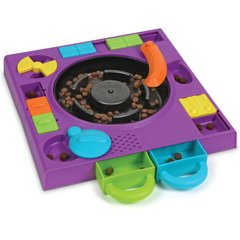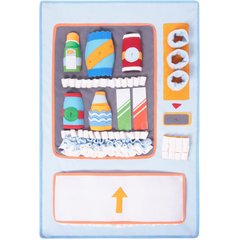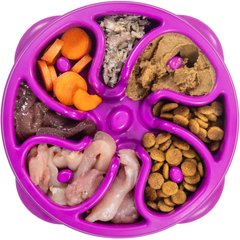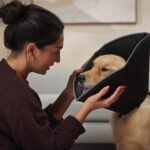The Signs of Bloat in Dogs—and How To Prevent It
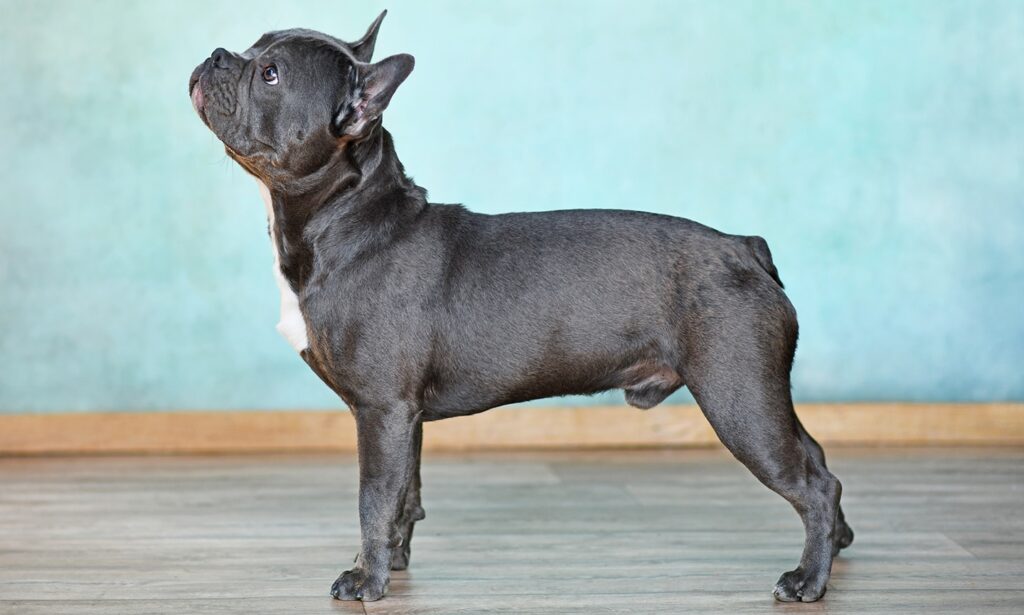
Photo by Firn/ iStock/Getty Images Plus
In humans, feeling bloated might entail little more than unbuttoning your jeans and spending a couple of uncomfortable hours vegging out in front of the TV until it passes. Bloat in dogs, however, is a serious condition that can turn into a life-threatening emergency called gastric dilatation-volvulus (GDV), in which the stomach twists or flips.
There are several signs that all dog parents should be aware of, including if their dog has a bloated tummy, is panting, drooling excessively, or displaying unsuccessful attempts to vomit, just to name a few. Fortunately, there are ways to prevent bloat in dogs (or at least reduce the risk), including feeding your pooch smaller, more frequent meals; avoiding excessive activity after meals; and preventative surgery.
We spoke to vet experts to get all the important details, including the full range of symptoms to watch out for and what you can do to mitigate your dog’s bloat risk.
What Is Bloat in Dogs?
Bloat (aka gastric dilatation) occurs when the stomach fills with gas, fluid and/or food (usually a combination), leading to an abnormal expansion.
As the stomach becomes distended, it may twist, like a wet towel being rung out, and become kinked off. The twisting—referred to as GDV—blocks the stomach entrance and exit, preventing the normal release of stomach contents (food, gas, water, etc.). It can also interfere with the blood supply to the stomach and other vital organs, like the spleen and heart.
Signs of Bloat in Dogs
The symptoms of bloat and GDV are nearly identical, so if you notice any of their common signs, it’s imperative to bring your dog to a veterinary clinic or pet emergency clinic ASAP.
GDV and bloat symptoms in dogs include:
- Excessive panting (when not appropriate, such as during rest)
- Excessive salivation or drooling
- Vomiting (or unproductive attempts to vomit)
- Not pooping or only releasing small-volume diarrhea
- Distended abdomen
- Painful abdomen
- Rapid heart rate
- Rapid, shallow breathing
- Unable to get comfortable and lie down
- Restlessness and pacing
- Whining
- Collapse
Are Bloat and Canine GDV Serious? When To Visit the Vet
“Bloat is an extremely serious condition that requires immediate veterinary attention, as it can rapidly progress to GDV, which is life-threatening,” says Dr. Andrea Johnston, DVM, a board-certified small-animal veterinary internist based in Minnetonka, Minnesota, and medical board member at The Vets.
Before it progresses to GDV, bloat can sometimes resolve on its own, but this is not something that can be counted on or waited for, stresses Dr. Johnston.
Once bloat progresses to GDV, a cascade of biological events occur that make it life-threatening. A twisted stomach in dogs compromises blood flow to the stomach and other vital organs, resulting in systemic shock. The enlarged stomach can press on the diaphragm, leading to difficulty breathing. In extreme cases, the stomach wall can rupture due to the pressure of internal gas.
It has been estimated that 10-23 percent of dogs with GDV do not survive when treatment is attempted. Without treatment, it’s always fatal.
“Time is of the essence, as GDV can lead to shock, organ damage and death within a matter of hours,” says Dr. Johnston.
Even if your dog’s condition turns out not to be bloat or GDV, it’s better to err on the side of caution and have your dog evaluated by a veterinarian as soon as possible, she adds.
Causes of Bloat in Dogs
“Canine bloat is a condition that is not completely understood by veterinarians, and we do not know the exact causes of bloat,” says Dr. Alison Birken, DVM, a veterinarian at Victoria Park Animal Hospital in Fort Lauderdale, Florida. “We do know that certain breeds of dogs are more susceptible to this condition.”
Generally speaking, large breeds with a narrow, deep chest have the greatest risk for developing GDV because they have more room for stomach movement in the abdomen and behind the rib cage. But bloat can occur in smaller dogs, too.
Some of the breeds most at risk for bloat include:
- Great Dane
- Standard Poodle
- Bernard
- Mastiff
- Large hound breeds (e.g., Irish Wolfhound, Bloodhound, etc.)
- German Shepherd
- Irish Setter
- Boxer
- Weimaraner
- Doberman Pinscher
Other risk factors for developing bloat include:
- Being male
- Having a family history of bloat (i.e., a parent or sibling had the condition)
- Being older (aged above 7 years old)
- Having a nervous, fearful or reactive temperament
- Going through a stressful event
- Eating rapidly
- Eating or drinking a large amount followed by excessive or vigorous activity, such as running
- Eating one large meal a day
- Eating moistened dry food, especially if citric acid is an ingredient
- Being thin or underweight
While less common, puppies can also experience bloat and GDV. The signs of bloat in puppies are generally the same as in adult dogs.
How Vets Diagnose Bloat in Dogs
Differentiating between bloat and GDV based on symptoms alone is very challenging, if not impossible.
“While both involve a distended stomach, GDV requires immediate surgical intervention, as it involves twisting of the stomach, which can only be confirmed through imaging tests like X-rays,” says Dr. Johnston.
In addition to imaging, a vet will perform a physical exam and run blood tests to assess the dog’s health status.
Treatment of Dog Bloat
There’s no at-home treatment for bloat, so it’s vital to take your dog to a vet immediately. Here’s an overview of the dog bloat treatment process:
- Stabilization and testing: The immediate goals are to stabilize the dog’s condition and determine if the bloat has progressed to GDV. This typically involves administering intravenous fluids to address shock and electrolyte imbalances and taking X-rays.
- Decompression: Whether the dog’s stomach is twisted or not, the first step is alleviating the pressure in the stomach. The vet will sedate the dog and insert a tube through the mouth that goes into the stomach to release gas. If the tube cannot pass through due to the twist in the stomach, a large-bore needle or catheter is inserted into the stomach (via the side of the abdomen) to relieve the pressure.
- Surgery: If the dog’s stomach was determined to be twisted, they’ll undergo emergency surgery. This entails untwisting the stomach, assessing the condition of the stomach and spleen, removing any dead tissue (and sometimes the entire spleen) and attaching the stomach to the abdominal wall to prevent it from twisting again (a procedure called gastropexy).
Even if a dog’s stomach was not yet twisted, they may undergo a preventative gastropexy to prevent the stomach from twisting in the future.
How To Prevent Bloating in Dogs
The most effective way to ensure your dog doesn’t develop GDV is to have your vet perform a preventative gastropexy. This is a common preventative measure in predisposed breeds and is often performed at the time of spay or neuter, says Dr. Johnston.
Here are strategies you can implement to help reduce the risk of bloat and GDV.
Feed Smaller, More Frequent Meals
“Instead of one or two large meals a day, consider dividing your dog’s daily food intake into smaller, more frequent meals,” suggests Dr. Johnston. “This can help prevent the stomach from becoming overly distended.”
Slow Down Your Dog’s Eating
“Some dogs are prone to eating too quickly, which can increase the risk of swallowing air and developing bloat,” says Dr. Johnston.
To slow down your dog’s eating pace, use puzzle feeders, such as the Brightkins DJ Doggo Puzzle Feed Toy; snuffle mats, such as the Frisco Vending Machine Snuffle Mat; and slow-feed bowls, such as the Outward Hound Fun Feeder Dog Bowl.
Recommended Products
Avoid Exercise After Meals
Vigorous exercise immediately after eating can increase the risk of GDV, says Dr. Johnston. The general rule of thumb is to wait one hour after your dog eats a meal to engage them in vigorous exercise, she adds. A short, non-strenuous walk after eating shouldn’t cause problems, though.
Reduce Your Dog’s Stress
Stress has been associated with an increased risk of bloat in dogs. Try to minimize stressors in your dog’s environment, especially around mealtime, suggests Dr. Birken.
Offer Water in Small Amounts
Making sure your dog stays hydrated is of course important, so you want to have water available at all times while at home. However, to reduce the risk of bloat, it’s better to offer water in smaller portions. This approach can prevent your dog from gulping down large amounts of water in one go, says Dr. Birken.
If your dog has a distended belly or any of the other symptoms mentioned above, get your pup to a vet STAT. But bloat isn’t the only condition to be aware of. Learn about other common health issues that, like bloat, large breed dogs are predisposed for.
Expert input provided by Dr. Alison Birken, DVM, a veterinarian at Victoria Park Animal Hospital in Fort Lauderdale, Florida; and Dr. Andrea Johnston, DVM, a board-certified small-animal veterinary internist based in Minnetonka, Minnesota, and medical board member at The Vets.
This content was medically reviewed by a veterinarian.
